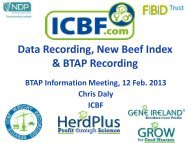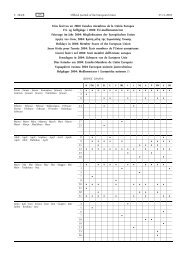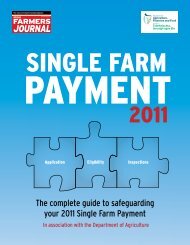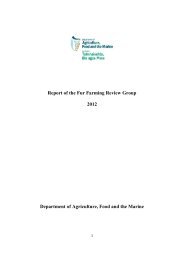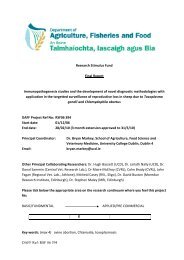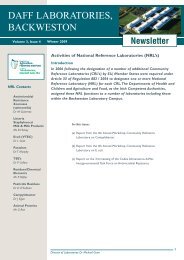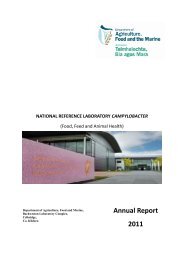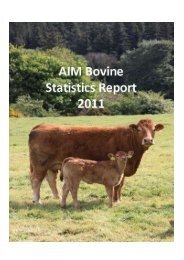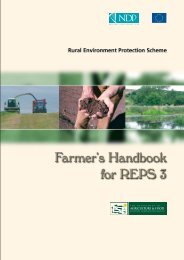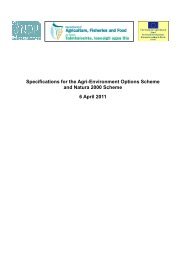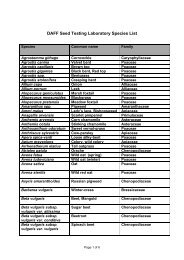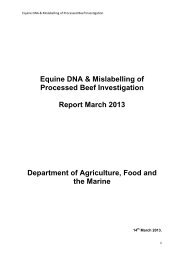Food Research Ireland - Department of Agriculture
Food Research Ireland - Department of Agriculture
Food Research Ireland - Department of Agriculture
You also want an ePaper? Increase the reach of your titles
YUMPU automatically turns print PDFs into web optimized ePapers that Google loves.
The available suite <strong>of</strong> Irish dietary and food consumption surveys, and<br />
related nutritional surveillance databases meet the highest international<br />
standards. These databases can provide food companies with brand specific<br />
food; nutrient intake data for all groups within the Irish population and<br />
detailed food ingredient and packaging material data. These databases play<br />
a central role in the study <strong>of</strong> acute and chronic food chemical exposure and<br />
have / can be used for risk management in relation to possible food<br />
contamination instances and are also important for chemical and<br />
microbiological risk assessment.<br />
In addition, long-term, longitudinal studies and randomly controlled dietary<br />
intervention studies, as funded through various agencies (FIRM, HRB,<br />
Welcome Trust, <strong>Food</strong> Standards Agency, European Commission Framework<br />
Programme), are a key strength in <strong>Ireland</strong>’s institutionally based nutritional<br />
research activities. Obesity and associated chronic diet related diseases,<br />
together with an insufficient nutrient supply in subgroups <strong>of</strong> the population,<br />
are likely to remain major health concerns for at least 20 years. Coupled with<br />
the special nutritional demand in aging societies, they demand immediate<br />
measures for improvement. The projected changes in both population<br />
demographics and life-span demand that European public health policies<br />
focus on 'healthy ageing'.<br />
<strong>Ireland</strong> has established a major international lead in the integration <strong>of</strong> public<br />
health nutrition and nutrigenomics data and has access to genomic data and<br />
in most cases, to metabolomic, proteomic, transcriptomic and imaging data.<br />
Just as several genetic variants contribute to the risk <strong>of</strong> any particular illness,<br />
it is clear that different variants affect the absorption, metabolism, catabolism<br />
and excretion <strong>of</strong> nutrients. These in turn dictate individual nutrient<br />
requirements and are the basis <strong>of</strong> “personalised nutrition”. Identifying and<br />
addressing such nutritional variants, opens up opportunities for Irish food<br />
companies to create new markets for specialised food products.<br />
<strong>Research</strong> Objectives:<br />
■ The development <strong>of</strong> potential biomarkers which can eventually be<br />
used as the end points in the evaluation <strong>of</strong> dietary intervention studies<br />
with novel bioactives;<br />
■ Exploitation <strong>of</strong> existing databases to inform new product development<br />
for Irish food companies in the context <strong>of</strong> lifestage nutrition;<br />
■ Where health claims are intended for particular food products,<br />
appropriately designed acute, chronic and acute-on-chronic human<br />
intervention studies should be included in many <strong>of</strong> the proposed<br />
research areas;<br />
■ Existing national databases need to be updated on a regular basis to<br />
ensure the currency <strong>of</strong> the data for addressing nutrition and food<br />
safety issues, and also be thoroughly interrogated and exploited to<br />
underpin public health policy, especially for infants, the elderly and<br />
those suffering from diet related diseases including obesity and Type<br />
II diabetes. To maximize their value and ensure international<br />
recognition, these databases should be linked to comparable<br />
resources in other EU member states to maximize their value.<br />
This should be facilitated through the Joint Programming Initiative<br />
“A Healthy Diet for a Healthy Life”;<br />
■ A nutrition research programme which considers the following:<br />
■ the use <strong>of</strong> food based strategies in the prevention <strong>of</strong> nutrient<br />
deficiencies;<br />
■ the impact <strong>of</strong> nutrition, maternal health and prenatal<br />
programming as determinants <strong>of</strong> longer-term healthy ageing,<br />
including skeletal and metabolic health;<br />
■ the use <strong>of</strong> new and effective food-based strategies to optimise<br />
lean body mass in the older population, including maintenance<br />
<strong>of</strong> muscle function and prevention <strong>of</strong> osteopenia, osteoporosis<br />
and cognitive decline;<br />
■ the use <strong>of</strong> the Internet to collect dietary data should be<br />
developed drawing on expertise in nutrition, s<strong>of</strong>tware<br />
engineering, social network and marketing;<br />
■ the exploitation <strong>of</strong> existing databases to link genotype with<br />
phenotype (physiological and clinical) and ultimately with<br />
biomarkers;<br />
■ the exploitation <strong>of</strong> existing databases to establish metabotypes<br />
and nutritypes, i.e. clusters <strong>of</strong> individuals sharing similar<br />
metabolic signatures and food choice; and the development <strong>of</strong><br />
urinary biomarkers <strong>of</strong> habitual dietary patterns<br />
■ Enhancement <strong>of</strong> the health promoting potential <strong>of</strong> fruits, vegetables<br />
and cereals through the development <strong>of</strong> customised agronomic and<br />
processing practices.<br />
<strong>Food</strong> <strong>Research</strong> <strong>Ireland</strong><br />
▼<br />
37



